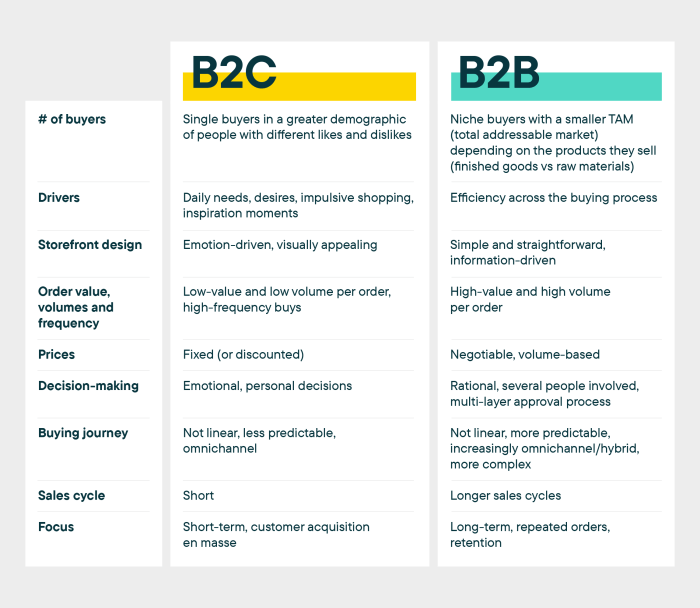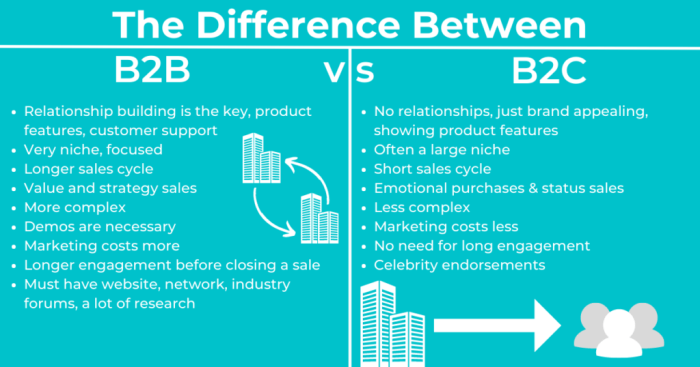Understanding B2B and B2C Sales sets the stage for unraveling the distinct realms of business-to-business and business-to-consumer sales, offering insights into their unique dynamics and strategies.
Delve deeper into the nuances of these sales approaches to uncover the secrets behind successful transactions and customer relationships.
Understanding B2B and B2C Sales
In the world of sales, it’s crucial to understand the differences between B2B (Business to Business) and B2C (Business to Consumer) sales. Let’s break it down.
Overview of B2B Sales
In B2B sales, transactions occur between businesses. This means companies selling products or services to other companies or organizations, rather than individual consumers.
Overview of B2C Sales
On the other hand, B2C sales involve selling products or services directly to consumers. This could be anything from a retail store selling clothing to an individual customer, to an online service catering to individual users.
Target Audiences
The target audience for B2B sales is typically other businesses, which may include decision-makers, procurement managers, or other professionals within the organization. In contrast, B2C sales target individual consumers who are looking to purchase products or services for personal use.
Importance of Relationship-Building in B2B Sales, Understanding B2B and B2C Sales
Building strong relationships is paramount in B2B sales. Since the transactions are usually higher in value and involve longer-term commitments, establishing trust and credibility with clients is crucial for success. This can lead to repeat business and referrals, ultimately driving growth.
Decision-Making Process
In B2B sales, the decision-making process is often more complex and involves multiple stakeholders within the organization. Factors such as budget, long-term goals, and return on investment play a significant role in the decision-making process. In contrast, B2C sales decisions are usually made by individual consumers based on factors like price, convenience, and personal preferences.
Key Differences Between B2B and B2C Sales

In the world of sales, there are significant variations between B2B (business-to-business) and B2C (business-to-consumer) transactions. Understanding these variations is crucial for success in both types of sales.
Primary Objectives of B2B Sales
In B2B sales, the primary objective is to establish long-term relationships with other businesses. This involves catering to the specific needs of the business, providing solutions to their problems, and ensuring mutual growth and success.
Role of Trust in B2B Sales Transactions
Trust plays a critical role in B2B sales transactions. Businesses rely on trust to form partnerships, make large purchases, and engage in long-term contracts. Building trust involves consistent communication, reliable delivery of products or services, and transparency in all dealings.
Marketing Strategies in B2B vs B2C Sales
Marketing strategies in B2B sales focus on educating the target audience, showcasing expertise, and highlighting the value of long-term partnerships. B2B marketing often involves content marketing, networking events, and personalized communication tailored to the specific needs of businesses.
Examples of Products/Services Suitable for Each Type of Sales
– B2B Sales: Software solutions for businesses, bulk raw materials for manufacturing companies, consulting services for corporate clients.
– B2C Sales: Clothing and accessories for individual consumers, beauty products for personal use, entertainment subscriptions for individual households.
Sales Process in B2B and B2C

In the world of sales, understanding the differences between B2B and B2C processes is crucial. Let’s dive into the unique sales processes of these two sectors.
Typical Sales Cycle in B2B Sales
In B2B sales, the typical sales cycle is longer and more complex compared to B2C. It involves multiple decision-makers and stakeholders, requiring a strategic approach to nurturing leads and building relationships. The process often includes stages such as lead generation, prospecting, qualification, proposal, negotiation, and closing the deal.
Importance of Personalized Selling in B2B Transactions
Personalized selling is paramount in B2B transactions as it involves catering to the specific needs and challenges of each business client. By understanding their pain points and offering tailored solutions, sales professionals can build trust and credibility, ultimately leading to successful partnerships and long-term business relationships.
Comparison of Sales Funnel in B2B and B2C Sales
The sales funnel in B2B sales is typically narrower and more focused compared to B2C. This is because B2B transactions involve fewer but higher-value deals, requiring a more targeted approach to lead qualification and conversion. In contrast, the B2C sales funnel is wider and involves a larger volume of transactions with shorter sales cycles.
Influence of Emotions in B2C Sales vs. B2B Sales
Emotions play a significant role in B2C sales, where consumer decisions are often driven by factors such as brand perception, personal preferences, and impulse buying. In contrast, B2B sales are more rational and logic-driven, with decisions based on factors like ROI, cost-effectiveness, and long-term benefits. Understanding these emotional influences is key to tailoring sales strategies effectively in both B2B and B2C environments.
Customer Relationship Management in B2B and B2C: Understanding B2B And B2C Sales
Customer relationship management (CRM) plays a crucial role in both B2B and B2C environments. However, the strategies and challenges differ significantly between the two.
CRM Systems in B2B and B2C
In B2B sales, CRM systems are more focused on managing complex relationships with fewer clients. The interactions are usually more personalized and involve longer sales cycles. CRM systems in B2C, on the other hand, deal with a larger customer base, focusing on mass communication and shorter sales cycles.
Challenges in B2B Customer Relationships
Maintaining customer relationships in B2B sales can be challenging due to the high stakes involved. Building trust, meeting specific business needs, and handling multiple decision-makers within an organization are some of the key challenges faced in B2B CRM.
Successful CRM Strategies in B2C Sales
In B2C sales, successful CRM strategies often involve leveraging data analytics to personalize marketing campaigns and enhance customer experience. Companies like Amazon and Starbucks excel in using customer data to offer personalized recommendations and loyalty programs.
Impact of Customer Loyalty in B2B vs. B2C Sales
Customer loyalty plays a crucial role in both B2B and B2C sales. In B2B, repeat business is often driven by long-term relationships, trust, and delivering value consistently. In B2C, customer loyalty leads to repeat purchases, referrals, and brand advocacy, driving revenue growth.